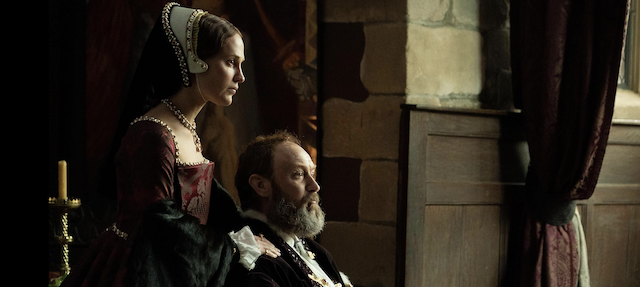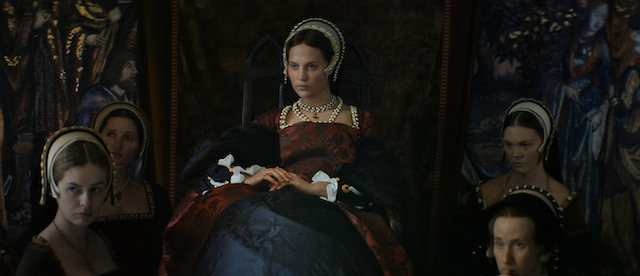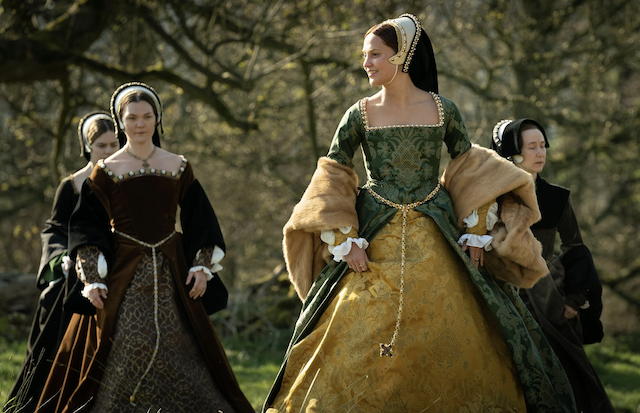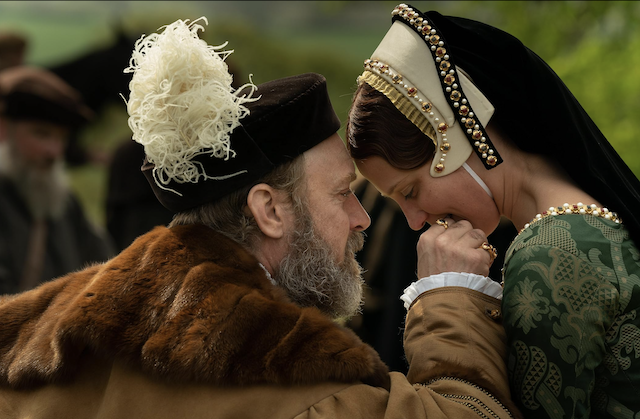
Photo by Larry Horricks/Larry Horricks – © Brouhaha Entertainment Limited 2023
Firebrand : In blood-soaked Tudor England, twice married, accomplished, and educated Catherine Parr (Alicia Vikander), reluctantly agrees to become the sixth wife of the tyrannical King Henry VIII (Jude Law). Her consent to marry him carries great personal risk, given that her predecessors are either vanquished, beheaded, or dead. When Henry appoints her as Regent, the nation’s ruler during his absence when he departs to fight overseas, he lays a dangerous path for her.
Henry’s courtiers, suspecting she’s sympathetic to radical Protestant beliefs that have taken root in the kingdom and are a threat to their power, scheme against her and cast doubts upon her fidelity to the increasingly ailing and paranoid King. Once Henry returns to England, his courtiers convince him to turn his fury on the nation’s radicals, including Katherine’s childhood friend Anne Askew, who becomes one of the scores of people convicted of treason and burned at the stake. Horrified and privately grieving, Katherine finds herself under ever-increasing scrutiny and suspicion. Knowing that even a whisper of scandal might lead to her downfall, Katherine must unleash her own scheme to fight for survival.
Director : Karim Aïnouz
Producer : Carolyn Marks Blackwood, Gabrielle Tana
Screenwriter : Jessica Ashworth, Henrietta Ashworth, Elizabeth Fremantle, Jessica Ashworth, Henrietta Ashworth, Rosanne Flynn
Distributor : Roadside Attractions / Vertical
Production Co : Brouhaha Entertainment

Photo by Larry Horricks/Larry Horricks – © Brouhaha Entertainment Limited 2023
Exclusive Interview with Director Karim Aïnouz
Q : When I see this film, even though it takes place in the feudal era, I see the voice of femininity and the strong will of a woman. We see so many stories about Henry VIII, but it’s really engaging to look through the eyes of one of his wives. So how did you end up actually tackling this project?
Karim Aïnouz: Listen, I was invited by a producer to do this project. And this is like back in 2020. There was a book, that the script was based on. I didn’t really understand why she had invited me because I’m Brazilian, and half Algerian, I’ve lived in the U S all my life, but I’ve never done English language films. I just didn’t really understand why she thought of my name because I didn’t really know who Henry VIII was, let alone Catherine Parr, but then I started to get very intrigued by the fact that she thought they could do it.
And [this producer] had seen my other movies and there were a lot of characters, particularly female characters, in the other movies I’d done before that she thought were very similar to Catherine Parr, even if they were done in Brazil and in other countries. So I was curious and then I started looking at the history from a very fresh perspective.
So I researched about the Tudor era and also about women at that time in history. And I read many books about Henry and Catherine Parr. There were a few kind of biographies. And what I thought when I saw all of this, coming from a very sort of non-English perspective, I felt it was very strange. I thought [Henry] was a very interesting character, but I was very surprised of how many movies there were made about him—and how few books there were about the only woman who survived him.
So I thought ‘oh, that’s interesting.’ And then there was a moment that I felt I was in England really considering doing this because I was really interested in Catherine. … I don’t think history has done justice to her.
She was the first published author in England. She was a stateswoman. She raised Elizabeth, who would become this very important sort of monarch. And so I was very curious why nothing had been done about her before. And I understood, being in England for a while.
I guess a lot of the movies have been made by men and I think there was also the fact that there was this obsession with this guy who was interesting, but yet like a tyrant, And I felt it was a great opportunity to bring light to this character, [Catherine Parr] that had been overshadowed by a way of telling history.
So that’s how it began. And the more I dove into the character, the more I found out about her and researched about her. It felt to me like she was a really important character in history that had not been talked about enough. So that’s how it all started because I think that there is this sense that Henry is this incredible king and so on, but he had a very problematic reign, and I think he was also a very much a classic man, running a kingdom full of privilege.
And so that, for me, seemed also very interesting. If I would make a movie today about Trump and Melania, I’ll probably not make a movie about Trump, but Melania. I think she seems to be more interesting than him, I also thought there was an interesting possibility of [describing] this man that has been ruling the world forever and forever, but by looking at another side.
I think that Catherine has a very particular trajectory, I’m not comparing her to Melania at all. I think that she has a very particular trajectory, that’s how it started. I think the fact of not being English allowed me to have a fresh perspective.
Q : I find it really engaging about the depiction of Henry VIII. Oftentimes, Henry VIII was presented as the most charismatic ruler, but what’s engaging about this film is that you describe him as a very cultured, actually mannered man. And he speaks in Spanish, Latin, French and Italian. And he’s also very active as a writer and a composer as well. So how carefully did you guys construct the film with these cultural elements of Henry VIII’s character?
Karim Aïnouz: I think it was very interesting to think of him not as a monster to begin with, but to think of him as a man that was born privileged, so he was just occupying the place that one should occupy if you were born like Henry. I think for me it’s much more interesting to understand that people are not born like this, that they are like this because of where they are in the context.
Also, I think what’s interesting here for me is to look at how a man of that stature is about to die. This is a man that probably thought that he was immortal. And he was also a very interesting young man. He was a really talented musician. He knew how to speak different languages. He was very cultivated. He was a sportsman. We did so much research about his daily life. He was also a romantic—a sort of perverse romantic because when he didn’t get what he wanted just got rid of people
Q : Right
Karim Aïnouz: The question here, which was for me really important is this: he was really looking for love. He was looking for somebody who would love him as a man. … I was talking to Jude [Law] yesterday, for example, and, he said something very beautiful, like Henry was a man, a king, and also God. So I think the man really needed to be loved as any other human being. So I think that’s also a key question when we’re looking at this character, that there was something which was God and this king was dying, and then people were dying. They become much more vulnerable and they really become angry. They become frustrated but they become also very soft and vulnerable.
So I think this is also the moment that we chose to tell that story—the moment when you know, the king is somehow passing away.

Photo by Larry Horricks/Larry Horricks – © Brouhaha Entertainment Limited 2023
Q : I’m curious to know why Henry VIII was dubious about the marriage. When he was only 10 years old, he was involved in an arranged marriage to Catherine ]of Aragon] (his first wife) after receiving permission from the Pope due to his brother’s death and everything.
Do you think that suspicion about his marriage started earlier because I can understand why he was dubious, and something triggered him to react after their first marriage.
Karim Aïnouz: I think that’s one factor, the question of like how he got married to the wife of his brother. But I also think there was the question of Catherine Howard and how she betrayed him and maybe how Anne Boleyn betrayed him. I think this man had been through a bunch of relationships that have been complicated, problematic, and that have tarnished.
And I think it’s also interesting, after all of these relationships, that he marries a woman who was not that young. I think Catherine was 32 when she married Henry. I think he was quite paranoid. I think of the fact that he had this ulcer in his leg and it was really getting worse and worse. There was a degree of delusion that was also happening there.
And I think when you are in that state, if you had traumatic experience before— meaning the way that he married Catherine of Aragon, the way that Catherine Howard betrayed him, the way that Anne Boleyn supposedly betrayed him—it would make him very irritable and paranoid. And I think that has a lot to do with it.
Q : Henry VIII’s daughter, Elizabeth expressed the fear of getting killed by her father because her mother was killed. So talk about the vulnerability in her circumstances growing up that way. Because I cannot imagine the fear of getting killed by your father when your mother is already dead
Karim Aïnouz: It’s a really interesting question you’re asking there about Elizabeth and about the fear. I really think it’s important to think about that moment in history and particularly, the Tudors. These were gangs, these were very violent tribes.
I’m not gonna say that the Tudors were a tribe because it’s more complicated than that. But I think these are very normal dynamics. At that time, these are people that were very violent, that had to fight nature to exist at that time. It was very rough.
Take the fact that he decapitated her mother. I mean he didn’t but I think it’s interesting that Henry wouldn’t do it with his own hands, right? He always had somebody to do it for him. When you do research, [you find that] he executed 36,000 people during his reign.
So that’s a lot of people. And to come back to your first question, that’s why I was also super interested in Henry because it was a very violent time. It was not the feudal times, but it was just after that.
And I think it’s very interesting how we always think of Henry as this guy who has a chicken leg in his hand and is funny. People laugh about him but actually it was the other way around–this was a very dangerous moment in history. I think also England was not the empire we know today. So I think the violence that Elizabeth felt was something very legitimate. I also think that she was close to Catherine because it was the only sort of safe place that she could know. She was a constant reminder of Anne Boleyn for him, so there was this feeling of love and also hate.
Q : Jude Law was phenomenal in this film, not just his performance, but he had to prepare the physicality of it with makeup and all. So, what kind of conversation did you have with Jude about that?
Karim Aïnouz: I think there was an amazing amount of documentation about Henry that we found. There was a lot of work we did with a doctor who published a book about his last days, and his physical condition in the last days.
We did something which was like classic research, not about Henry the King, but about a man who was dying, about a man who was sick. I think Jude spent a lot of time in preparation walking with weights on his legs, for example, to understand how Henry was moving around.
I think there was a lot of work we’d done, for example, taking down the blueness of [Jude’s] eyes and [giving him] dark eyes. We also did a lot of things to do with costume and in movement with Henry. I think it was very interesting to work with Jude, who was always coming onto the set in costume and makeup. So I never really saw Jude Law throughout the shoot. I think I met him once or twice on a day off, but mostly he would come to the set, go to his green room and come out completely done. So I forgot who Jude Law was and I just started seeing Henry.
So I think that was really exciting, this sort of transformation that he did, and there were things we did as well with perfumes–he was stinking all the time. And I think that we did something around the fever, because he had an infection.
There was this graph that we did, like today he has 37 degrees of fever, today he has 37. 8, then he has 39 degrees of fever, and that impacts the way that your body trembles and the way that you sweat, you know. So this is also something we did from day one to the end of the story where we see what his temperature was and his clinical condition. This was also super important for him.
Nobuhiro Hosoki: Okay, this will be the last question. Catherine Parr was the first woman to publish a book under her name in British history. I’m curious to know what kind of conversation you had with three female screenwriters because this film has a strong female perspective. But at the same time, this is actually a story about her surviving the marriage. So could you talk about how did you balance out the historical element, like surviving the marriage?
Karim Aïnouz: I think it was, this is a job that was done by the writers. This is a book that was adapted and then there were amazing screenwriters that did the drafts and the script that we shot.
And I think it was really interesting to come from this perspective. They were very young, and they were super talented and amazing screenwriters. And then they were really interested in the danger, you know, of the character. We took a lot of liberty from the book, but also I think of how the writers were very young—they had this energy which was really beautiful. You know that they really wanted this story to be the story of a woman who was resisting—moving around the circles of power and negotiating things through soft power. It was really exciting.
And I said it would be almost impossible for a man to tell that story. As a director, yes, but not as a writer. I don’t think I could have written that because it’s such a profoundly feminine way of dealing with power.

Photo by Larry Horricks/Larry Horricks – © Brouhaha Entertainment Limited 2023
If you like the article, share your thoughts below!
Check out more of Nobuhiro’s articles.
Here’s the trailer of the film.

